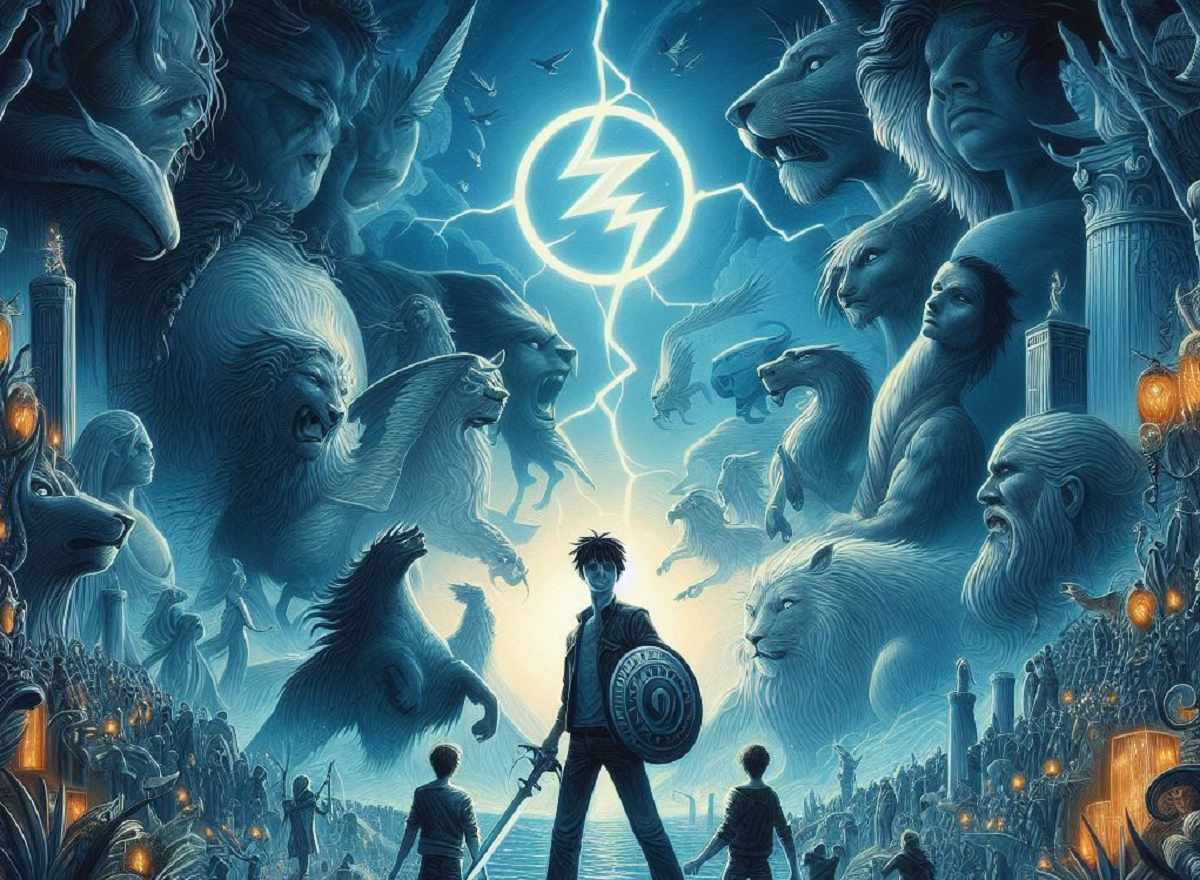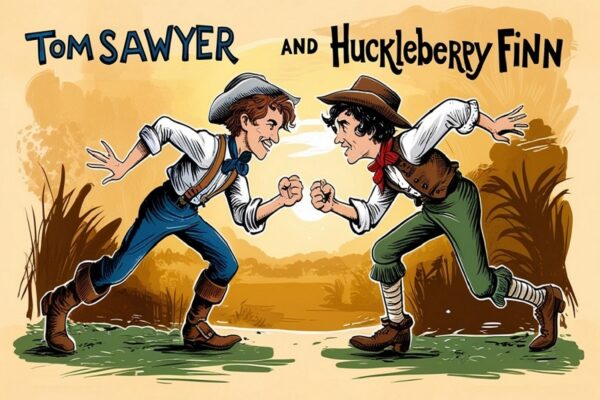The Lightning Thief serves as the opening book in Rick Riordan’s series titled Percy Jackson & the Olympians. This captivating novel revolves around the thrilling exploits of twelve-year-old Percy Jackson, who unexpectedly discovers his status as a demigod. Armed with this newfound knowledge, Percy embarks on a perilous quest to avert an imminent and devastating war brewing among the gods residing on Mount Olympus. Want to embark on this magical journey? Then, read this summary of The Lightning Thief till the end!

The Lightning Thief Summary
The story begins with Percy, a sixth-grade student at Yancy Academy. He faces a series of peculiar events that eventually lead to his expulsion, all stemming from an unusual incident involving his math teacher, Mrs. Dodds. While on a trip to the beach, he unexpectedly encounters a minotaur—an ancient creature from Greek mythology. Adding to the surprise, Percy’s closest friend, Grover, reveals himself as a satyr—a mythical creature responsible for guarding demigods.
Amidst the chaos, Sally, Percy’s mother, successfully guides him to Camp Half-Blood. This camp stands as a sanctuary for demigods like Percy, where he discovers the truth about his lineage as Poseidon’s son, the Greek God of the sea. As he adapts to camp life, Percy becomes entangled in an accusation of stealing Zeus’ powerful master bolt. The disappearance of this lightning bolt has severe consequences and threatens to ignite a war among the gods.
Chiron, the wise centaur trainer at the camp, and Mr. Brunner, Percy’s former teacher, provide clarity regarding the theft of Zeus’ lightning bolt. This incident has triggered a potential conflict between Zeus and Poseidon as Zeus suspects Percy’s father of being responsible for the theft. In order to clear his father’s name and prevent an impending war among the gods, Percy embarks on a daring quest to retrieve the stolen bolt.
Percy embarks on a quest accompanied by his demigod comrades, Grover and Annabeth. Together, they venture through various locations, including the Underworld, where they encounter Hades. It is within this realm that they uncover a sinister plot to falsely accuse Percy’s father of theft involving the master bolt. Adding to their predicament, Hades holds Percy’s mother hostage until he retrieves the stolen item. Throughout their journey, Percy and his friends face mythical creatures and formidable challenges that test their abilities while showcasing their determination.
During their journey, they encounter Medusa, an imposing creature capable of petrifying people with a single gaze. Percy demonstrates his cleverness by outsmarting her and ultimately triumphing over her, acquiring her decapitated head in the process. This severed head possesses the power to transform adversaries into lifeless statues.
Additionally, they face difficulties at the Lotus Hotel and Casino. This peculiar place seems to halt time, posing a threat to their mission. As they continue their quest, they uncover a shocking truth: Luke, a fellow demigod and son of Hermes, is actually the one responsible for stealing the master bolt. Luke harbors intentions of using it to overthrow the gods and establish a new world order. In their confrontation with Luke, Percy and his companions struggle to capture him before he escapes by summoning a dangerous creature.
The story reaches its climax atop the Empire State Building. There, Percy engages in a fierce battle with Luke. Utilizing his friends and his growing ability to manipulate water, Percy ultimately triumphs over Luke and successfully returns the master bolt to Zeus.
During a council meeting among the gods, a collective decision is made to prevent an impending war. It is within this gathering that Percy’s father, Poseidon, makes a rare appearance. With persuasive efforts from Percy, Poseidon openly acknowledges and claims his son as his own.
In the final section of the book, Percy and his friends triumphantly return to Camp Half-Blood. The camp celebrates their arrival, recognizing them as heroes. During this time, Percy receives a prophetic message from the Oracle that hints at upcoming trials and exciting adventures. Additionally, he discovers that the thief who stole the master bolt was merely a pawn in a larger scheme devised by an enigmatic adversary. The novel concludes with Percy deciding to continue honing his skills at Camp Half-Blood while preparing himself for any challenging obstacles that lie ahead.
Hurray! We came to the end of the magical journey of The Lightning Thief summary.
Main Characters of The Lightning Thief
The Lightning Thief introduces readers to a diverse and captivating cast of characters. From humans to mythical beings, they embark on an extraordinary journey through the enchanting world of Greek mythology. Let’s dive into the main characters that bring this thrilling adventure to life:
- Percy Jackson: He serves as both the protagonist and narrator of the story. At just twelve years old, he uncovers his true identity as a demigod, specifically the son of Poseidon, the Greek God of the sea. Initially unaware of his heritage, Percy quickly becomes entangled in a prophecy that holds significant consequences for Olympus. Notably brave, loyal, and resourceful, Percy naturally assumes a leadership role.
- Annabeth Chase: Annabeth Chase, a fellow demigod, accompanies Percy as his loyal friend and companion throughout the series. Born to Athena, the goddess of wisdom, Annabeth possesses exceptional intelligence along with strategic and combat skills. Her ambition is to revamp and enhance Olympus.
- Grover Underwood: Grover is Percy’s loyal friend and protector. He possesses a curious identity as a satyr, being part-human and part-goat. Grover embarks on a mission to seek out the deity Pan, who has mysteriously vanished. Notably attuned to nature, he nurtures a profound connection with the Earth.
- Luke Castellan: Luke is a multifaceted character who initially appears as Percy’s friend. As the son of Hermes, the Messenger God, Luke possesses unique demigod abilities. Yet, throughout the story’s development, Luke’s true intentions and loyalties become increasingly uncertain.
- Chiron: He is the wise and knowledgeable centaur, fulfills the role of Percy’s mentor at Camp Half-Blood, a refuge for demigods. He imparts his expertise and provides guidance to the young heroes during their quests. Chiron’s teaching abilities are highly regarded as he equips them with essential skills and invaluable wisdom for their adventures.
- Sally Jackson: Sally is an essential figure in Percy’s life. As his caring and protective mother, Sally plays a crucial role in shielding Percy from the perils of the demigod world until he reaches an age where he can comprehend his heritage.
- Mr. D (Dionysus): He is the director of Camp Half-Blood. Behind this title lies his true identity as the Greek God of Wine. Despite his grumpy and indifferent demeanor towards the campers’ problems, he serves as a source of comic relief within the story.
- Clarisse La Rue: He is a fellow camper at Camp Half-Blood and the leader of the Ares cabin. Throughout the series, she constantly competes with Percy and his friends, serving as their rival.
- The Gods of Olympus: In this story, we encounter several of the twelve Olympian gods and goddesses, including Zeus, Poseidon, Hades, and others. These divine beings play pivotal roles in the plot and possess their own distinct desires and conflicts.
- Minotaur: This magical creature presents Percy with one of his initial obstacles on his quest, portraying a powerful symbol that represents the lurking dangers within the realm of Greek mythology. This formidable and mythical creature tests Percy’s courage and resilience as he embarks on his epic journey.
The mortal and divine characters intertwine within a captivating world, where Greek mythology blends seamlessly with modern-day adventures.
Themes of The Lightning Thief
The summary of The Lightning Thief itself reveals a lot of themes entangled in this story. But, this book explores multiple central themes that deeply resonate with readers. It seamlessly blends elements of the contemporary world with the captivating realm of ancient Greek mythology. Let’s delve into some of these key themes and unravel their significance:
1. Identity and Self-Discovery: Percy Jackson, a demigod born to Poseidon, wrestles with his identity and the perennial challenge of fitting into both mortal and mythological realms. The crux of his tale lies in his transformative quest for self-discovery.
2. Friendship and Loyalty: Percy’s bond with Annabeth and Grover strengthens as they embark on a perilous quest, illuminating the significance of friendship through their unwavering loyalty and united support amidst challenges.
3. Good vs. Evil: In the age-old battle of good versus evil, the novel delves into Percy and his friends’ encounters with adversaries like Luke and the forces of Kronos. The story emphasizes the moral choices individuals face in this ongoing struggle.
4. Family and Belonging: Percy longs for his distant father, Poseidon, while navigating the complexities of his relationship with his mortal mother and stepfather. In this intricate dynamic, Camp Half-Blood becomes a surrogate family for demigods.
5. Acceptance of Differences: Camp Half-Blood is a place where demigods of different parentages unite, highlighting the importance of embracing diversity in race, background, and supernatural heritage.
6. Environmental Awareness: Grover’s mission to find the missing god Pan explores the connection between environmental conservation and human impact on the natural world, highlighting themes of environmental awareness.
7. Learning from the Past: In the narrative, the significance of Ancient Greek mythology emphasizes the importance of learning from history to navigate the present effectively.
8. The Hero’s Journey: The Lightning Thief adheres to the timeless hero’s journey archetype, where the main character encounters challenges, confronts adversaries, and experiences personal growth. This recurring theme significantly underscores Percy’s remarkable evolution from an uncertain young boy to a true hero.
9. Responsibility: In Percy’s journey, he discovers a crucial lesson about responsibility. He realizes that his powers should be used for the greater good and acknowledges that he alone is accountable for his actions and choices. This newfound understanding shapes his character development throughout the narrative.
10. Power and Authority: In Percy’s journey, he discovers a crucial lesson about responsibility. He realizes that his powers should be used for the greater good and acknowledges that he alone is accountable for his actions and choices. This newfound understanding shapes his character development throughout the narrative.
After exploring the summary of The Lightning Thief and its themes, let’s move on to read the quotes from this book.
Quotes from Percy Jackson and the Lightning Thief
Percy Jackson and the Olympians: The Lightning Thief by Rick Riordan is filled with memorable quotes. These quotes capture some of the humor, wisdom, and adventure found in the book and showcase the unique personalities of the characters. Here are a few:
- “Even strength must bow to wisdom sometimes.” – Chiron
- “The real world is where the monsters are.” – Grover
- “It’s funny, the things people say when they’re dying. Like somehow they are going to be around to hear how profound they were.” – Percy
- “You’re in the underworld, Percy. You don’t always get what you want.” – Hades
- “In a way, it’s nice to know that there are Greek gods out there, because you have somebody to blame when things go wrong.” – Percy
- “Being a hero doesn’t mean you’re invincible. It just means that you’re brave enough to stand up and do what’s needed.” – Annabeth
- “It’s hard to enjoy practical jokes when your whole life feels like one.” – Percy
- “Families are messy. Immortal families are eternally messy.” – Hermes
- “Bravery is always rewarded.” – Luke
- “Don’t feel bad, I’m usually about to die.” – Percy
- “Some people have war in their nature.” – Chiron
- “Fear is a strange thing.” – Grover
- “It’s funny how humans can wrap their mind around things and fit them into their version of reality.” – Chiron
- “Go on with what your heart tells you, or you will lose all.” – Chiron
- “Knowing too much of your future is never a good thing.” – Chiron
- “Humans see what they want to see.” – Hades
- “If my life is going to mean anything, I have to live it myself.” – Percy
- “It’s funny how humans can wrap their mind around things and fit them into their version of reality.” – Chiron
- “I should’ve told you the truth from the beginning. I thought if you knew what a failure I was, you wouldn’t want me along.” – Grover
- “Be honored, Percy Jackson. Lord Zeus rarely allows me to test a hero.” – Luke
Through this summary, it is clear that The Lightning Thief combines the captivating elements of Greek mythology with a modern adventure. This first book in the series sets the stage for further exploration into Percy Jackson’s thrilling adventures in the subsequent novels.
Recommended: Harry Potter and the Sorcerer’s Stone | Summary, Characters and Themes
About the Author
Rick Riordan is a renowned American author known for his popular series of young adult novels inspired by mythology, including Percy Jackson & the Olympians and The Heroes of Olympus. His books blend adventure, humor, and mythology, captivating readers of all ages with tales of young heroes facing mythical challenges.





Thank you for your articles. They are very helpful to me. Can you help me with something?
Hi Fitness,
Thank you for your kind words! I’m glad my articles are helpful to you.
Please feel free to ask your question. I’ll do my best to assist you. If it’s something I can’t directly answer, I may be able to point you in the right direction.
Best Regards,
Keerthana Prakasam